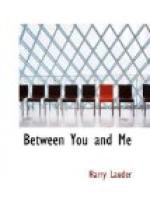But here’s what I’m meaning. We saw Belgium attacked. We saw France threatened wi’ a new disaster that would finish the murder her ain courage and splendor had foiled in 1871. We sprang to the rescue this time—oh, aye! The nation’s leaders knew the path of honor—knew, too, that it was Britain’s only path of safety, as it chanced. They declared war sae soon as it was plain how Germany meant to treat the world.
Sae Britain was at war, and she called oot her young men. Auld Britain—wi’ sons and daughters roond a’ the Seven Seas. I saw them answering the call, mind you. I saw them in Australia and New Zealand. I kissed my ain laddie gude bye doon there in Australia when he went back—to dee.
Never was there a grander outpouring of heroic youth. We’d no conscription in those first days. That didna come until much later. Sae, at the very start, a’ our best went forth to ficht and dee. Thousands—hundreds of thousands—millions of them. And sae I come to those wha were left.
It’s sair I am to say it. But it was in the hearts of sae many of those who stayed behind that we began tae be able tae see what had been wrang wi’ Britain—and what was, and remains, wrang wi’ a’ the world to-day.
There were our boys, in France. We’d no been ready. We’d no spent forty years preparing ourselves for murder. Sae our boys lacked guns and shells, and aircraft, and a’ the countless other things they maun have in modern war. And at hame the men in the shops and factories haggled and bargained, and thought, and talked. Not all o’ them—oh, understand that in a’ this I say that is harsh and bears doon hard upon this man and that, I’m only meaning a few each time! Maist of the plain folk i’ the world are honest and straight and upright in their dealings.
But do you ken hoo, in a basket of apples, ane rotten one wi’ corrupt the rest? Weel, it’s sae wi’ men. Put ane who’s disaffected, and discontented, and nitter, in a shop and he’ll mak’ trouble wi’ all the rest that are but seeking the do their best.
“Ca’ Canny!” Ha’ ye no heard that phrase?
It’s gude Scots. It’s a gude Scots motto. It means to go slow—to be sure before you leap. It sums up a’ the caution and the findness for feeling his way that’s made the Scot what he is in the wide world over. But it’s a saying that’s spread to England, and that’s come to have a special meaning of its own. As a certain sort of workingman uses it it means this:
“I maun be carfu’ lest I do too much. If I do as much as I can I’ll always have to do it, and I’ll get no mair pay for doing better—the maister’ll mak’ all the profit. I maun always do less than I could easily manage—sae I’ll no be asked to do mair than is easy and comfortable in a day’s work.”
Restriction of output! Aye, you’ve heard those words. But do you ken what they were meaning early i’ the war in Britain? They were meaning that we made fewer shells than we could ha’ made. Men deed in France and Flanders for lack of the shells that would ha’ put our artillery on even terms with that of the Germans.




